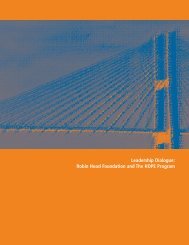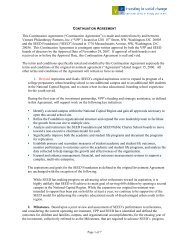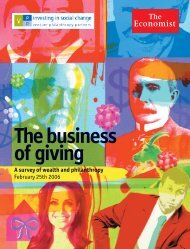Introduction, Essays on High-Engagement Grantmaking - Venture ...
Introduction, Essays on High-Engagement Grantmaking - Venture ...
Introduction, Essays on High-Engagement Grantmaking - Venture ...
You also want an ePaper? Increase the reach of your titles
YUMPU automatically turns print PDFs into web optimized ePapers that Google loves.
Julie L. Rogers<br />
The Eugene and Agnes E. Meyer Foundati<strong>on</strong>:<br />
Sixty Years of Engaged Philanthropy in the Greater Washingt<strong>on</strong> Regi<strong>on</strong><br />
by Julie L. Rogers<br />
What does it take to “get engaged” This questi<strong>on</strong> is driving philanthropic organizati<strong>on</strong>s<br />
of all stripes to rethink their assumpti<strong>on</strong>s, reorient their missi<strong>on</strong>s, and recast their relati<strong>on</strong>ships<br />
with the organizati<strong>on</strong>s and the initiatives they support. At the Eugene and Agnes E.<br />
Meyer Foundati<strong>on</strong>, it is a questi<strong>on</strong> we have asked ourselves and others throughout our<br />
60-year history.<br />
Julie L. Rogers is president of the Eugene<br />
and Agnes E. Meyer Foundati<strong>on</strong>, which<br />
awards over $6 milli<strong>on</strong> annually to<br />
Washingt<strong>on</strong>, DC, metropolitan area<br />
n<strong>on</strong>profit organizati<strong>on</strong>s that are working to<br />
build healthy communities through health,<br />
educati<strong>on</strong>, neighborhood development,<br />
justice, and arts programs. The foundati<strong>on</strong><br />
also operates the N<strong>on</strong>profit Sector<br />
Advancement Fund, which runs programs<br />
to promote the effectiveness of the foundati<strong>on</strong>’s<br />
grantees and strengthen the n<strong>on</strong>profit<br />
sector. Ms. Rogers was the founding chair<br />
(1992-1995) of the Washingt<strong>on</strong> Regi<strong>on</strong>al<br />
Associati<strong>on</strong> of Grantmakers and c<strong>on</strong>tinues<br />
to serve <strong>on</strong> its board. She also founded<br />
two major philanthropic collaboratives:<br />
the Washingt<strong>on</strong> AIDS Partnership and the<br />
Community Development Support<br />
Collaborative, created in collaborati<strong>on</strong><br />
with the Fannie Mae Foundati<strong>on</strong>. She is<br />
a board member and vice-chair of the<br />
Forum of Regi<strong>on</strong>al Associati<strong>on</strong>s of<br />
Grantmakers, has served <strong>on</strong> the board<br />
of directors of the Foundati<strong>on</strong> Center<br />
(1991-2000), and has served <strong>on</strong> the<br />
membership and annual c<strong>on</strong>ference committees<br />
of the Council <strong>on</strong> Foundati<strong>on</strong>s. She<br />
is a director and serves <strong>on</strong> the executive<br />
committee of both the Greater Washingt<strong>on</strong><br />
Board of Trade and the Federal City<br />
Council. Ms. Rogers also serves <strong>on</strong> the<br />
boards of the DC College Access Program,<br />
<strong>Venture</strong> Philanthropy Partners, and the<br />
Langley School in McLean, Virginia. She<br />
serves <strong>on</strong> the advisory committee of the DC<br />
Local Initiatives Support Corporati<strong>on</strong><br />
(LISC) and is a member of the Washingt<strong>on</strong><br />
Women’s Forum.<br />
She received a B.A. from Duke University<br />
and an M.A. in Teaching from George<br />
Washingt<strong>on</strong> University, where she also did<br />
doctoral work in educati<strong>on</strong>.<br />
The Essential Elements of <strong>Engagement</strong><br />
In Meyer’s view, getting engaged with our n<strong>on</strong>profit partners and the larger community<br />
in which they operate requires us to do the following:<br />
• Understand “n<strong>on</strong>profitness” and the unique roles that n<strong>on</strong>profits play in our<br />
society. In the July 2001 issue of The N<strong>on</strong>profit Quarterly, thinkers such as Paul Light<br />
of The Brookings Instituti<strong>on</strong> and J<strong>on</strong> Pratt of the Minnesota Council of N<strong>on</strong>profits<br />
remind us that we are <strong>on</strong>ly beginning to build the theoretical base for understanding<br />
what drives n<strong>on</strong>profit effectiveness.<br />
• Adopt a holistic view of the organizati<strong>on</strong>s we support. The key is to understand<br />
that effective programs and organizati<strong>on</strong>al capacity are inseparable—you can’t have<br />
<strong>on</strong>e without the other.<br />
• Stick with it. <strong>Engagement</strong>, by its very definiti<strong>on</strong>, means being involved with an<br />
organizati<strong>on</strong> over time and through different life cycles, including the messy <strong>on</strong>es. It<br />
means rejecting the “hero today, zero tomorrow” mentality when things go less than<br />
smoothly and helping an organizati<strong>on</strong> over the rough spots so it is “built to last.”<br />
• Invest in the n<strong>on</strong>profit “ecosystem.” N<strong>on</strong>profits seldom work al<strong>on</strong>e, and they<br />
flourish when supported by str<strong>on</strong>g colleague organizati<strong>on</strong>s, n<strong>on</strong>profit associati<strong>on</strong>s,<br />
and rich sources of management and technical assistance. The challenge for philanthropic<br />
organizati<strong>on</strong>s is to do whatever we can to strengthen critical parts of the<br />
n<strong>on</strong>profit ecology—both nati<strong>on</strong>al and regi<strong>on</strong>al—based <strong>on</strong> the belief that isolati<strong>on</strong> kills<br />
even the best-capitalized organizati<strong>on</strong>.<br />
• Look at yourself. <strong>Engagement</strong> means looking both outward and inward. All of us<br />
in the philanthropic community need to become as engaged in improving our own<br />
effectiveness as we are in improving the effectiveness of others. More specifically,<br />
we need to take a hard look at our own operati<strong>on</strong>s and seek h<strong>on</strong>est feedback about<br />
our work from our community and our n<strong>on</strong>profit partners.<br />
The Meyer Foundati<strong>on</strong> sees engaged philanthropy as including a broad spectrum of<br />
activities—from management-assistance grants and cash-flow loans to technology circuit<br />
riders and nurturing productive and respectful relati<strong>on</strong>ships with our n<strong>on</strong>profit community<br />
partners, am<strong>on</strong>g other efforts.<br />
The Meyer Foundati<strong>on</strong> believes that the term “engaged philanthropy” refers not just to<br />
a funder’s relati<strong>on</strong>ships with its grantees but also to its engagement with the larger community.<br />
In doing our work, we pay heed to the power of place, the need for a regi<strong>on</strong>al<br />
perspective, and the web of c<strong>on</strong>necti<strong>on</strong>s that is required to develop and sustain n<strong>on</strong>profit<br />
leaders and organizati<strong>on</strong>s over time. We keep in mind the fact that engagement is a<br />
marath<strong>on</strong>, not a sprint.<br />
13






